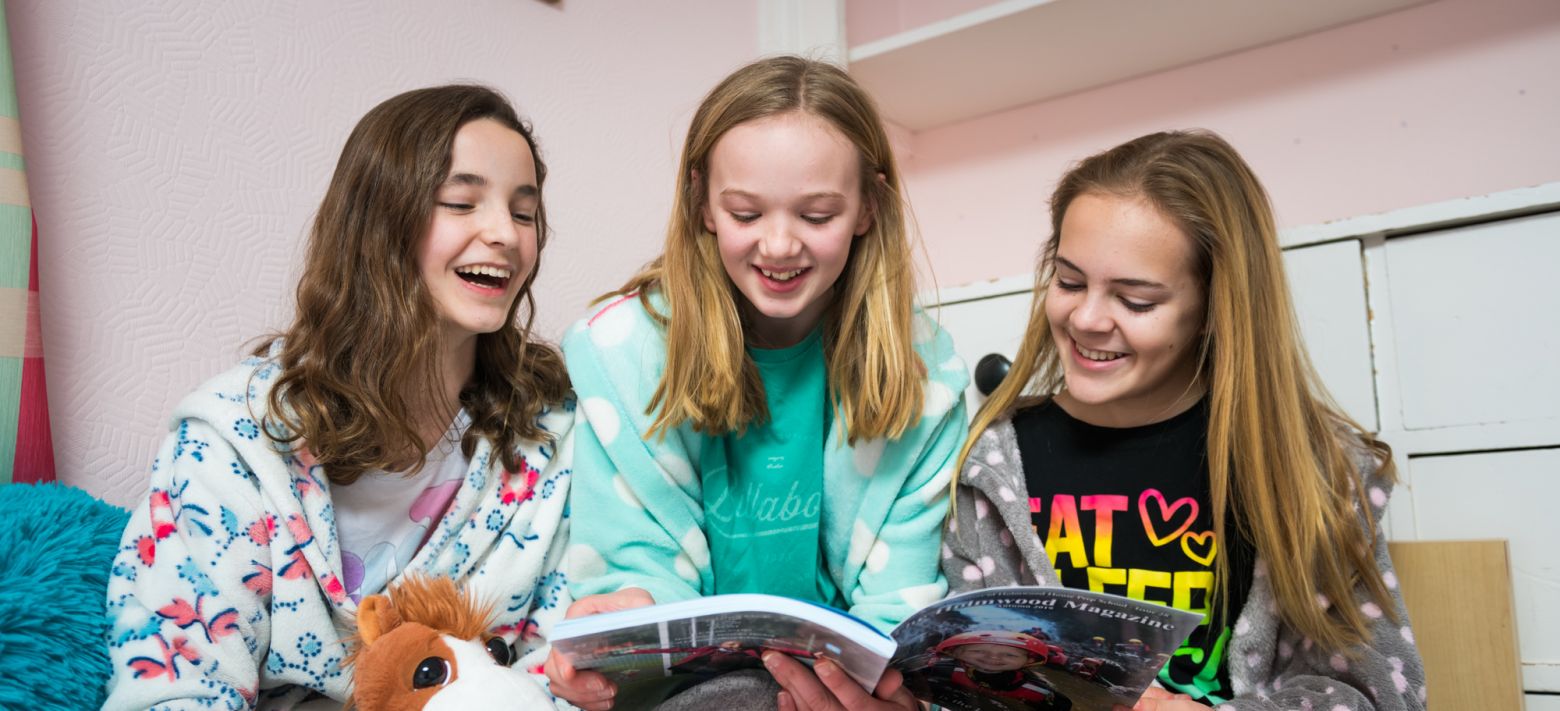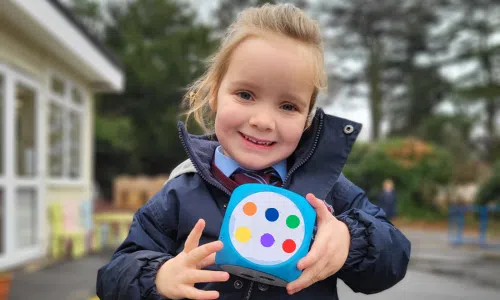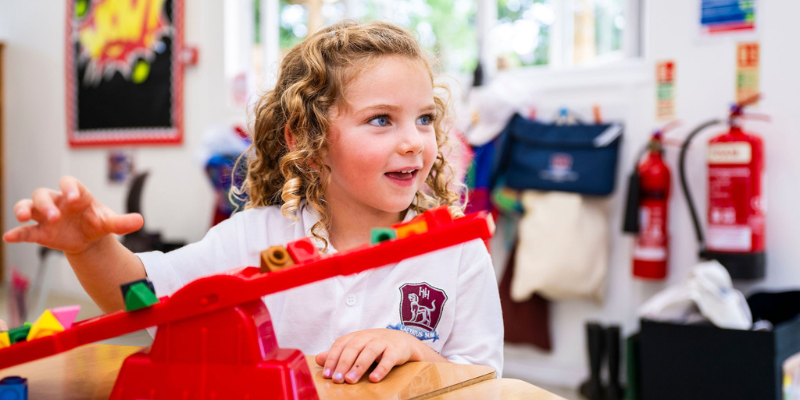Maths. For some, it’s a source of endless fascination, a puzzle to be solved. For others, it can be a source of anxiety and confusion. But one thing is certain: maths is everywhere. From the moment we wake up and check the time to planning a journey or sharing a pizza, we’re using mathematical skills. At Holmwood House, we believe in nurturing a love of maths by connecting it to the real world, making it both challenging and approachable for children from Reception to Year 6 and beyond. We are also passionate about stretching our pupils, pushing them to think critically and develop a deep understanding of mathematical concepts in the important primary years, so they have strong foundations when they enter senior school.
Why Real-World Maths Matters (and Why Stretching Matters Too!)
Children learn best when they can see the relevance of what they’re learning. Abstract concepts can be difficult to grasp, but when maths is grounded in reality, it becomes engaging and meaningful. Real-world applications help children understand why they’re learning a particular skill, not just how. This fosters a deeper understanding and a greater appreciation for the power of maths. But we also believe in the importance of stretching our pupils, challenging them to go beyond the basics and explore the more intricate and fascinating aspects of mathematics.
Maths in Action: From Reception to Year 6 (and Beyond!)
At Holmwood House we believe in bringing maths to life and stretch our pupils at all stages of their educational journey.
Preschool & Nursery: These little learners discover maths through play. Play isn’t just fun, it’s fundamental to early maths learning, we weave mathematical concepts into children’s natural play. Research shows this approach is highly effective. Through play, children naturally explore numbers, shapes, and patterns. Building towers teaches height and balance, water play explores capacity, and shop play introduces counting. By problem-solving and making connections during play, children build a strong foundation for future mathematical success.
Reception: Our young learners are immersed in practical maths from their first day in Reception. They just don’t always know it! Whether it’s counting toys, sorting objects by colour and shape or measuring ingredients for playdough – this all cements the foundations for future mathematical success. Sing games, songs, and hands-on activities reinforce learning making it fun and accessible. We also introduce some more formal concepts such as addition and subtraction, as well as early problem-solving activities, encouraging children to think creatively and reason mathematically.
Key Stage 1 (Years 1 & 2): Building on the foundations laid in Reception, children begin to explore further and extend concepts like addition, subtraction, and simple fractions. We use real-world scenarios for division, such as sharing sweets or toys, working with mathematical equipment to measure the classroom, or calculating the cost of groceries to illustrate these concepts. Think imaginative play shops, building with blocks to understand spatial reasoning, and even using nature to explore patterns. We begin to introduce more complex problem-solving, encouraging children to explain their reasoning and explore different strategies.
Key Stage 2 (Years 3-6): As children progress, they tackle more complex topics like multiplication, division, decimals, and percentages. We continue to connect these concepts to real-life situations. Planning a school trip involves calculating distances and costs. Designing a garden requires understanding area and perimeter. Even understanding sports statistics or following a recipe involves maths! This is where we really focus on stretching our pupils. We encourage problem-solving and critical thinking, challenging children to apply their knowledge in creative ways, such as setting up a pizza business or designing a space ship. We introduce open-ended problems that have multiple solutions, encouraging them to think outside the box. We also provide opportunities for them to explore more advanced topics and delve deeper into areas that particularly interest them. This might involve participation in maths challenges, coding activities, or independent research projects.
Holmwood House Approach: Challenging, Encouraging, and Supporting
We understand that every child learns at their own pace. Our approach to teaching maths is designed to be challenging, supporting, and focused on encouraging each individual, ensuring that every child can reach their full potential.
- Hands-on Learning: We believe in the power of hands-on learning. Children use manipulatives, games, and real-world objects to explore mathematical concepts. This helps them develop a concrete understanding before moving on to more abstract ideas. We also use hands-on activities to introduce more advanced concepts, and further up the school, pupils go on trips to places like Bletchley Park, the National Space Centre, and the University of Essex to see the impact of maths in the real world.
- Differentiated Instruction and Extension Activities: We differentiate our instruction to meet the needs of all learners. We provide extra support for those who need it, while also challenging advanced students with enrichment and extension activities. These activities are designed to push them beyond the curriculum and explore more complex and interesting mathematical ideas.
- Problem-Solving Focus and Mathematical Thinking: We encourage children to become confident problem solvers. We present them with real-world challenges that require them to apply their mathematical skills. We encourage them to think creatively and to persevere even when faced with difficulties. We also focus on developing their mathematical thinking – the ability to reason logically, analyze problems, and justify their solutions.
- Positive Mindset and a Growth Mindset: We foster a positive mindset towards maths. We believe that everyone can be good at maths with hard work and perseverance. We celebrate successes and encourage children to learn from their mistakes. We also promote a growth mindset, emphasising that intelligence is not fixed and that everyone can improve with effort and practice.
Laying the Foundations: Primary to Secondary Transition
A strong foundation in primary school maths is crucial for success at KS3 and GCSE levels. Our curriculum ensures that students develop a deep understanding of key mathematical concepts, problem-solving skills, and logical reasoning that will serve them well as they progress to more advanced topics. By making maths engaging and relevant from an early age, we help build the confidence needed for future academic success.
Inspiring a Love of Maths (and a Desire to Excel!) – Tips for Parents
At Holmwood House, we believe that learning extends beyond the classroom. Here are some tips for parents to support their child’s mathematical development at home:
- Make maths part of everyday life: Look for opportunities to incorporate maths into everyday activities; talk about time, distances, and measurements when cooking, shopping, or traveling. Even simple things like counting objects or sorting laundry can reinforce mathematical concepts.
- Play board games: That involve strategy and problem-solving and having fun!
- Encourage a positive attitude: Avoid saying things like “I’m not good at maths,” as this can influence your child’s perception of their own abilities. Instead, focus on the positive aspects of maths and emphasize the importance of perseverance.
- Ask questions, don’t just give answers: Encourage your child to explain their thinking and reasoning. Ask open-ended questions like “How did you solve that?” or “Can you think of another way to do it?” This helps them develop their mathematical thinking skills.
- Use online resources and games: There are many excellent online resources and games available that can make learning maths fun and engaging. Look for websites and apps that align with your child’s age and interests. See list below.
- Communicate with your child’s teacher: Stay in touch with your child’s teacher to find out what they’re learning in class and how you can support them at home. They can provide you with specific suggestions and resources.
Most Importantly: make maths interesting and engaging! Learning maths should be an enjoyable experience. Focus on making it fun and engaging, and your child will be more likely to develop a love of learning.
At Holmwood House, we’re passionate about inspiring a love of maths in our pupils. By connecting maths to the real world, we make it relevant, engaging, and fun. But we also go beyond this, providing opportunities for our pupils to stretch their mathematical muscles, to explore challenging problems, and to develop a deep and lasting appreciation for the beauty and power of mathematics. We empower our children to become confident mathematicians who are equipped to succeed in the 21st century, and who are not afraid to tackle even the most complex mathematical challenges by helping them unlock their potential and stretching it to its fullest.
Maths Resources
National Numeracy: This charity offers the “Family Maths Toolkit,” providing free, engaging activities for parents and children. It focuses on building confidence and showing how maths is used in everyday life.
White Rose Maths: A very popular resource in UK primary schools. They provide schemes of learning, worksheets, and other materials based on a “mastery” approach. Many of their resources are free.
BBC Bitesize: A classic for educational resources. BBC Bitesize offers interactive lessons, videos, and quizzes covering all areas of the primary maths curriculum.
Categories: News Category 1



